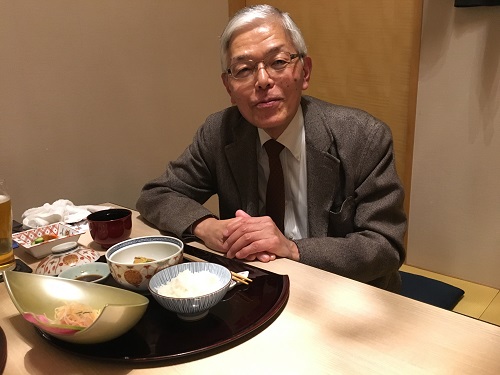
Sound advice: Tateo Arimoto
By Michael Banks in Tokyo, Japan
US President Donald Trump might be in Japan right now eating hamburgers and playing golf with the recently re-elected prime minister Shinzo Abe, but his presence didn’t stop me and Physics World editor Matin Durrani having our own high-level meeting as we began our week-long tour of the country.
After landing at Haneda airport in Tokyo, we headed straight to our downtown hotel for a meeting with Tateo Arimoto, who is director of science, technology and innovation at the National Graduate Institute for Policy Studies and a principal fellow of the Japan Science and Technology Agency (JST).
Over a light dinner of sushi, rice and vegetables, we had a wide-ranging and frank discussion about the role of scientific advice in Japan.
Arimoto, who has had a 40-year career in Japanese science-policy circles, noted that before the deadly earthquake and tsunami that hit Japan in 2011, scientific advice to the Japanese government was fragmented. Back then, there was no clear mechanism for giving scientific advice to the government, which proved problematic when quick action was needed after the Fukushima nuclear plant was hit. Science advisers are common in other leading scientific nations, notably the UK and the US (though Trump has still not appointed anyone to the role, almost 10 months after taking office). But no such position existed in Japan.
“Following Fukushima, the government wasn’t able to call on an appropriate mechanism for advice and analysis,” says Arimoto.
Japan has since gone on to set up the Council for Science, Technology and Innovation, which is chaired by prime minister Abe. Yet the council, which meets every month, mostly focuses on how to boost innovation in Japan, with many of its panel members being leading figures from industry. A single science adviser still does not exist.
In 2015 Japan’s foreign ministry became the first government body to appoint a dedicated science adviser, which Arimoto says was “a very important move”.
The first person to hold the position, which changes hands every two years, is the materials scientist Teruo Kishi from the University of Tokyo who is a former president of the National Institute for Materials Science. “The JST is supporting Kishi in this role,” says Arimoto. “But we need more help.”
So does Japan need a central figure to give science advice to the prime minister? Arimoto was coy about giving a straight answer, noting that whether it is better to have a single person or a panel depends on the national system as well as cultural aspects.
My hunch is that Arimoto is in favour of the Japanese government appointing a chief scientific adviser.
Indeed, he pointed to the impact that John Beddington, who was the UK’s chief scientific adviser from 2008 to 2013, had in the immediate aftermath of the Fukushima incident. Whereas France chose to move its citizens out of Tokyo, despite the Fukushima plant being 300 km to the north of the capital, Beddington’s advice to the UK embassy was that such drastic action for UK nationals in the country was not necessary. “That quick decision alone helped stabilize the situation in Japan,” Arimoto admits. As he wrote in a fascinating article last year, Beddington’s advice not only helped British and Japanese people, “It created positive impacts on Anglo–Japanese diplomatic relations”. If Trump wants to boost US–Japanese links, perhaps he should not waste any more time without his own science adviser.
Once our dinner was over, Arimoto headed straight to the airport to attend the World Science Forum in Amman, Jordan where he will be talking about rebuilding broken societies through reconstruction.
Guidelines
Show/hide formatting guidelines
this text was deletedwhere people live in harmony with nature and animals</q>
Some text